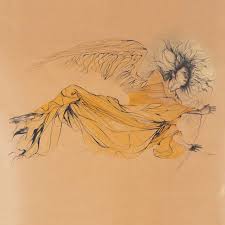For priests, magicians, soothsayers and irritating footballers throughout history, the implementation of specific rites in the form of ritual was, and still is, considered essential for appeasing the gods and harnessing those invisible natural forces that govern the lives of men. From the taking of communion at church on a Sunday morning to the methodical disposal of a sacrificial bull’s body in Minoan Crete, we as a species feel a deep urge to practise these recurrent tasks in an attempt to tap into the cyclical nature of the world we inhabit, to exert some influence over such unalterable phenomena as the changing of the seasons, the coming of the rains and the movement of the tides. Even now, when we live in an enlightened age where the week’s weather forecast is readily available from the same smartphone that houses your secret copy of the Kim Kardashian game, the draw of ritual and superstition can exert a powerful effect on the human psyche.
Norwegian left-field popstar Susanna understands this human need for ritual more than most bishops. Throughout Triangle she repeatedly employs the power of mantra and prayer to invoke the spiritual aspects of rock, root and river and bend those unchanging cycles of nature to her will. Several songs consist of little more than a single stanza repeated and recast until it becomes an incantation. Others, such as ‘Shepherd’, draw to mind the kind of pastoral hymnal Enya mastered long ago, ballads that morph into intangible paeans to the earth that transcend such trivial constraints as time and language. At its best the album manages to be so instantly familiar you wonder if it is managing to evoke your suppressed ancestral memories from distant generations; at its worst it feels alien and disconcerting in its pastoral mysticism, like lobby music for a pagan death cult.
Customarily the ritual of religion reflects the balance and stability that is found in the earth’s seasons and humours, but here Susanna opts for a more active and chaotic form of ritual: magic. This imbalanced approach can be clearly gleaned from her exploration of the traditional four elements in her lyrics. On occasion she might offer regard to the ground that she feels beneath her toes, the wind that grazes her face and the fire that burns inside her, but all of this is swept away by her reverence to the element of water. The same black lake she introduced on the final track of Meshes Of Voice, her 2014 collaboration with Jenny Hval, makes repeated appearances across Triangle, establishing itself as the source of dark energy from which Susanna replenishes her aura across the album’s mammoth runtime. At least 10 of the 22 songs here contain a reference to water in one form or another, imbuing it with a spiritual importance that it is essential to understand in order to understand Triangle‘s attempt to apply the mores of ancient magic to modern music.
Susanna own peculiar brand of chamber folk has always played around with her witch-like onstage persona, but on Triangle she fully inhabits the role, putting the ‘y’ and ‘k’ in wyrd and magickal respectively. Occultism drips from the plethora of natural images Susanna evokes: the ‘gods of violets’ that pull mortal beings down into the earth on ‘Hole’, the scattered bones, needles and feathers of ‘Texture Within’ and, of course, her beloved black lake and the supernatural power of water. One of the most universal magical techniques employed by witches, from Ancient Thessalians to modern Wiccans, is the casting of a spell to draw down the moon (as its waxing enhances the abilities of a woman in much the same way as it does the sea). Susanna’s decision to write a moon-drawing spell on ‘Ebb And Flow’ is just about the most open admission she could have made that she is attempting to harness an extensive legacy of female sorcery.
And it works. It works scarily well. This is the most powerful ode to our bond with the natural world by a Scandinavian pop singer since Biophilia. But where Bjork obsessed with science Susanna opts instead for the ageless draw of witchcraft and ritual, that eternal quest to siphon off the power of the earth under our feet. It’s a sparse, isolated and overlong affair that’s more difficult to love than previous solo outings like the lush The Forester or the sweet Wild Dog. However, for an artist with the vision to take such on such a huge subject as the three-pronged relationship between one woman, her gods and her planet, even managing to squeeze it down to a mere 22 songs is achievement enough. That the album is spectacular, introspective and terrifying all in equal measures is just a bonus.


